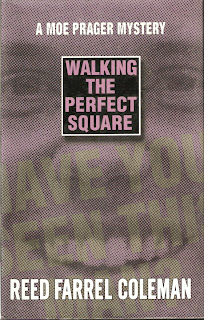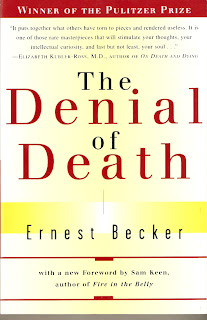I know I'm late to the party on this one, but after reading it, I came on-line and read every review of it I could find. I also read the author interviews. As highly praised as it is, I still think it is greatly underestimated.
The book involves a missing person, and the dustjacket art on the first-edition hardcover represents the idea of the missing man's face on a poster, Jack O'Lantern generic. Have you seen this man?
The first epigraph is: "To be is to be perceived. -- Berkeley."
The second epigraph quotes the lyrics to Graham Parker's rock song, "Nobody Hurts You."
Together the epigraphs suggest problems with identity, are we what others perceive? Or is "to be" merely to perceive ourselves? The last line of the song says that nobody hurts you like you do yourself. Taken with the title, the question might be, do we walk the perfect square for the sake of others' perceptions or for ourselves? The perfect square might suggest the missing man, dancing in the estimation of others, trying to live up to a false ideal.
But listen to the opening segment. It is a college drama class assignment, written by the now missing man, entitled "The Lie of Wetness." He wrote,
"You know what it's like? I'll tell you. You ever been to one of those fancy amusement parks like Busch Gardens or Hershey Park? Then you'll know what I'm talking about. At those parks they have those huge flume rides...they go like ten stories straight up in the air, swoop around a curve, then come flying...down into a big basin of water. The boat slams into the water...and boom! This freakin' wall of water soaks everything and everybody for like hundreds of feet around. Well, it's like that. Not the ride, exactly, but the waiting in line.'
"So you're standing there waiting your turn as this big line snakes around...and you're watching boat after boat go up that freakin' ramp and come splashing down. And there's like signs everywhere...Be aware: You WILL get wet.'
"It's not like you need those signs either, because everybody you see getting off the damn ride's so wet they could wring out their sunglasses and make a puddle. But see here, this is the point I'm trying to make about how it is: even though you watch everybody getting soaked and there's those signs that tell you you're going to get soaked, you tell yourself that you're not gonna get wet. Nope, not you! Somehow, all of a sudden, you're waterproof as Jesus in plastic slipcovers.'
"But then it's your turn. And you stick your feet into the boat and there's like six inches of standing water there and you're up to your ankles in it. Then it dawns on you: the signs weren't lying. And unlike Jesus, the water's gonna walk on you. So you look at the bald guy next to you and his toothless girlfriend or the mom and her frightened kids two rows up or the fat retarded guy in the tight tee shirt sitting alone behind you and you wonder how many other people getting on that ride with you told themselves the lie of wetness.'
"Well, that's my point, you see. It's like that, just like that. We don't come with slipcovers, so we lie to ourselves instead..."
Searching on Google just now, I could not find a review which commented on the opening. No interviewer asks about it either. It seems obvious to me that what is being discussed, the lie of wetness, is meant as the individual denial of death. The author's choice of this opening casts its shadows on the entire novel--perhaps even on his entire series, although I've yet to read his others.
I now have both the first hardcover edition and the splendid Busted Flush Press trade paperback. The latter has a nice foreword by mystery novelist Megan Abbott and an informative afterword by the author himself, talking about the evolution of his series protagonist and the authorial intention of his books.
The novel is many things, among them a period piece of 1978 with loads of historical and musical references involving the New York of that day. The only anachronism I noted was the too early mention of Gloria Gaynor's "I Will Survive" which did not come out until October of that year and got most of its play during 1979, winning its Grammy in 1980.
Never mind that. This is a remarkable detective novel, rich in atmosphere, gritty with a moral purpose, full of twists and turns, ultimately civilized and comforting--yet genre which pushes hard beyond the rules of genre. I'm sorry it took me so long to discover this one for myself, but I'm now delighted to have the rest of the series to read at my leisure.





I found this one to be almost unreadable, highly over-rated. It must just be me, because everyone else who has read it has liked it a lot. I guess that just happens sometimes.
ReplyDeleteI read the THE JAMES DEAN and thought him a good writer but haven't gotten back to him.
ReplyDelete